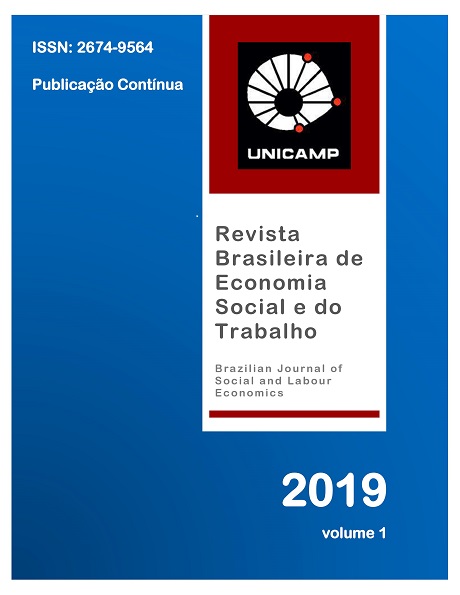Resumo
A reestruturação do capitalismo envolveu mudanças profundas no modo de operação das empresas, na integração dos mercados e na esfera de soberania do Estado. A globalização econômica acirrou a competição entre empresas, trabalhadores e nações. A ordem monetária internacional hierarquizada, comandada pelo dólar, potencializou um desenvolvimento desigual e combinado. O objetivo do artigo é estimular a reflexão sobre o capitalismo contemporâneo pela ótica da Economia Política. A dinâmica dos fluxos financeiros e o aumento dos estoques de riqueza produziram impactos na gestão macroeconômica, geração de empregos e distribuição de renda nos países desenvolvidos. A desindustrialização precoce de economias latino-americanas e a industrialização consistente de economias asiáticas alteraram a divisão internacional do trabalho e diferenciaram a periferia capitalista. A financeirização da riqueza e o empoderamento do rentismo restringiram a atuação da maioria dos governos em prol do pleno emprego e da proteção social. A difusão das cadeias globais de valor e a redefinição do padrão de concorrência de grandes corporações afetaram negativamente os sindicatos e o mercado de trabalho, aumentando o desemprego (mesmo que disfarçado) e a precariedade das relações de trabalho.
Referências
Alichi, A., Kantenga, K., & Solé, J. (2016). Income polarization in the United States. [IMF Working Paper, wp/16/121], International Monetary Fund, Washington. Retrieved from: https://www.imf.org/external/pubs/ft/wp/2016/wp16121.pdf.
Ashman, S. (2009). Capitalism, uneven and combined development and the transhistoric, Cambridge Review of International Affairs, 22(1), 29-46. doi: 10.1080/09557570802683896.
Bank of International Settlements (2015, June 28). BIS Annual Economic Report 2014/2015 (85th ed.). Basel, Switzerland. Retrieved from: https://www.bis.org/publ/arpdf/ar2015e.pdf.
BBC News (2016, January 22). Sir Michael Caine “sort of certain” UK should quit EU. [Site]. Retrieved from: https://www.bbc.com/news/uk-politics-eu-referendum-35380299.
Belluzzo, L. G. M. (2016). The recent internationalization of capitalization. In A. Bárcena & A. Prado (Eds.). Neostructuralism and heterodox thinking in Latin America and the Caribbean in the early twenty-first century (pp. 101-114). Santiago, Chile: Economic Commission for Latin America and the Caribbean (ECLAC).
Belluzzo, L. G. M., & Galípolo, G. (2017). Manda quem pode, obedece quem tem prejuízo. São Paulo: Editora Contracorrente.
Belluzzo, L. G. M., & Galípolo, G. (2019). A escassez na abundância capitalista. São Paulo: Editora Contracorrente.
Bertocco, G. (2017). Crisis and the failure of economic theory: The responsibility of economists for the Great Recession. Cheltenham, UK: Edward Elgar.
Borio, C. (2013). On time, stocks and flows: Understanding the global macroeconomic challenges. National Institute Economic Review, 225(1), 3-13.
Borio, C., & Disyatat, P. (2011). Global imbalances and the financial crisis: Link or no link? [BIS Working Papers n. 346], Bank for International Settlements, Basel, Switzerland.
Braga, J. C. de S. (2000). Temporalidade da riqueza: Teoria da dinâmica e financeirização do capitalismo. Campinas: Instituto de Economia-Unicamp (Coleção Teses).
Chandrasekhar, C. P., & Ghosh, J. (2018). A decade of speculation. Economic and Labour Relations Review, 29(4), 410-427.
Del Negro, M., & Schorfheide, F. (2013). DSGE model-based forecasting. In G. Elliott & A. Timmermann (Eds.) Handbook of economic forecasting (Vol. 2, part A, chap. 2, pp. 57-140). Amsterdam: North Holland.
Godley, W., & Lavoie, M. (2007). Monetary economics: An integrated approach to credit, money, income, production and wealth. New York: Palgrave Macmillan.
Hayek, F. A. (1973). Law, legislation and liberty (Vol. 1: Rules and order). Chicago: University of Chicago Press.
Keynes, J. M. (1936/2018). The general theory of employment, interest and money. Cambridge: Palgrave Macmillan. (eBook: https://doi.org/10.1007/978-3-319-70344-2).
Keynes, J. M. (1973). The General Theory and after, Part II. In D. Moggridge (Org.). The collected writings of John Maynard Keynes (Vol. XIV). London: Macmillan.
Lazonik, W. (2013). The financialization of the US corporation: What has been lost, and how it can be regained. Seattle University Law Review, 36(2), 857-909.
Lazonik, W. (2017, May 9). How the U.S. new economy business model has devalued science & engineering PhDs. Institute for New Economic Thinking.
Retrieved from: https://www.ineteconomics.org/perspectives/blog/marketization-and-financialization.
Marx, K. (1894/1984). O capital. Crítica da economia política (Livro 3, tomo 1). São Paulo: Abril Cultural.
Marx, K. (1861/1993). Grundrisse: Foundations of the critique of political economy (Draft). London: Penguin Books.
Mazzucchelli, F. (2004). A contradição em processo: O capitalismo e suas crises (2nd ed.). Campinas, SP: Unicamp.IE.
Minsky, H. (1983). Money and crisis in Schumpeter and Keynes. [Hyman P. Minsky Archive, Paper 334], Bard Digital. Retrieved from: http://digitalcommons.bard.edu/hm_archive/334.
Minsky, H. (1986). Stabilizing an unstable economy. New Haven: Yale University Press.
Piketty, T. (2014). Capital in the twenty-first century. Cambridge: Harvard University Press.
Piketty, T., & Zucman, G. (2014). Capital is back: Wealth-income ratios in rich countries 1700–2010. The Quarterly Journal of Economics, 129(3), 1255-1310.
Rutkowski, R. (2014, May 1). Are higher costs impacting Chinese export competitiveness? China Economic Watch, Peterson Institute for International Economics (PIIE). Retrieved from: https://www.piie.com/blogs/china-economic-watch/are-higher-costs-impacting-chinese-export-competitiveness.
Schumpeter, J. A. (1942/1994). Capitalism, socialism and democracy. London: Routledge.
Shivani, A. (2016, June 6). This is our neoliberal nightmare: Hillary Clinton, Donald Trump, and why the market and the wealthy win every time. Salon. Retrieved from: https://www.salon.com/2016/06/06/this_is_our_neoliberal_nightmare_hillary_clinton_donald_trump_and_why_the_market_and_the_wealthy_win_every_time/.
Smith, C. H. (2017, May 31). The Keynesian cult has failed: “emergency” stimulus is now permanent. SNB and CHF. Retrieved from: https://snbchf.com/2017/05/hugh-smith-keynesian-cult-emergency-stimulus/.
Standing, G. (2011). The precariat: The new dangerous class. London: Bloomsbury Academic.
Tselichtchev, I. (2012). China versus the West: The global power shift of the 21st century. Singapore: John Wiley & Sons Singapore.
United Nations Conference on Trade and Development (2003). Unctad Trade and Development Report 2003: Capital accumulation, growth and structural change. New York and Geneva: United Nations.
Varoufakis, Y. (2017, January 23). A New Deal to save Europe. Project Syndicate. Retrieved from: https://www.project-syndicate.org/commentary/new-deal-for-europe-by-yanis-varoufakis-2017-01?barrier=accesspaylog.
Wike, R., Fetterolf, J., & Fagan, M. (2019, March 19). Europeans credit EU with promoting peace and prosperity, but say Brussels is out of touch with its citizens. Pew Research Center [Site]. Retrieved from: https://www.pewresearch.org/global/2019/03/19/europeans-credit-eu-with-promoting-peace-and-prosperity-but-say-brussels-is-out-of-touch-with-its-citizens/.
Todo o conteúdo do periódico, exceto onde está identificado, está licenciado sob uma Licença Creative Commons Atribuição-NãoComercial-CompartilhaIgual 4.0 Internacional. A Revista adota o modelo de Acesso Aberto, permitindo gratuitamente a qualquer pessoa descarregar os textos, ler, copiar e disseminar para propósitos acadêmicos.

